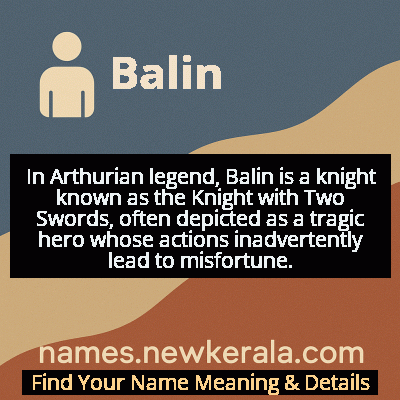Balin Name Meaning & Details
Origin, Popularity, Numerology Analysis & Name Meaning of Balin
Discover the origin, meaning, and cultural significance of the name BALIN. Delve into its historical roots and explore the lasting impact it has had on communities and traditions.
Name
Balin
Gender
Male
Origin
Arthurian
Lucky Number
2
Meaning of the Name - Balin
In Arthurian legend, Balin is a knight known as the Knight with Two Swords, often depicted as a tragic hero whose actions inadvertently lead to misfortune.
Balin - Complete Numerology Analysis
Your Numerology Number
Based on Pythagorean Numerology System
Ruling Planet
Moon
Positive Nature
Diplomatic, friendly, artistic, empathetic.
Negative Traits
Over-sensitive, moody, indecisive, prone to self-pity.
Lucky Colours
Green, cream, white.
Lucky Days
Monday.
Lucky Stones
Pearl, moonstone.
Harmony Numbers
1, 3, 4.
Best Suited Professions
Diplomats, mediators, caregivers, artists.
What People Like About You
Cooperative spirit, friendliness, artistic talent.
Famous People Named Balin
Sir Balin le Savage
Arthurian Knight
Wielder of the cursed sword that dealt the Dolorous Stroke
Balin (Tolkien character)
Dwarf Lord
Leader of the Dwarven colony in Moria in J.R.R. Tolkien's Middle-earth
Balin of Brittany
Legendary Knight
Brother of Sir Balan in medieval romance traditions
Name Variations & International Equivalents
Click on blue names to explore their detailed meanings. Gray names with will be available soon.
Cultural & Historical Significance
The cultural significance of Balin extends beyond medieval literature into modern fantasy and popular culture. J.R.R. Tolkien's adoption of the name for his dwarf character in 'The Hobbit' created an important literary bridge between Arthurian romance and contemporary fantasy. This connection has ensured Balin's continued relevance in modern storytelling, where he often appears as a symbol of tragic heroism and the complex relationship between personal honor and cosmic destiny. The name continues to inspire characters in fantasy literature, video games, and film adaptations, maintaining its power as a symbol of noble intentions leading to catastrophic outcomes.
Extended Personality Analysis
Balin's personality embodies the quintessential tragic hero - a man of immense courage and principle whose very virtues lead to his downfall. He is characterized by fierce independence and a deep-seated sense of personal honor that often puts him at odds with courtly conventions. His nickname 'le Savage' reflects his untamed nature and tendency to act on raw emotion and immediate justice rather than diplomatic consideration. This makes him both respected for his authenticity and feared for his unpredictability.
Despite his rough exterior, Balin demonstrates profound loyalty and unwavering commitment to his ideals. His relationship with his brother Balan highlights his capacity for deep familial bonds, while his interactions with Arthur's court reveal a complex man struggling to reconcile his wild nature with the demands of civilization. The tragic irony of Balin's character lies in how his most noble qualities - his courage, his sense of justice, his refusal to abandon his principles - ultimately orchestrate the series of events leading to his mutual destruction with his brother. This psychological complexity makes him one of the most compelling and human figures in Arthurian literature, representing the eternal conflict between individual will and predetermined fate.
Modern Usage & Popularity
In contemporary naming practices, Balin maintains a niche but meaningful presence, primarily among enthusiasts of Arthurian literature, fantasy genres, and parents seeking names with mythological significance. The name experienced a noticeable uptick in usage following the success of Peter Jackson's 'The Hobbit' film trilogy, where Balin appears as a wise, white-bearded dwarf played by Ken Stott. While never breaking into mainstream popularity charts, Balin consistently appears in literary-inspired naming circles and among communities with interest in medieval history and mythology. Its usage is most concentrated in English-speaking countries with strong Arthurian traditions, particularly the United Kingdom, where it occasionally appears in birth registries as an alternative to more common Arthurian names like Lancelot or Gawain. The name's relative rarity adds to its appeal for parents seeking distinctive yet culturally rich names for their children.
Symbolic & Spiritual Meanings
Balin serves as a powerful symbol of the tragic hero archetype, representing the complex interplay between noble intentions and catastrophic outcomes. His story embodies the medieval concept of 'wyrd' or fate - the idea that certain destinies are inescapable regardless of one's virtues or efforts. The two swords he carries symbolize the duality of his nature and the conflicting forces that govern his life: one representing his noble intentions, the other the cursed consequences of his actions. The 'Dolorous Stroke' he delivers becomes a metaphor for how single moments of action, however well-intentioned, can unleash chains of suffering that extend far beyond individual comprehension.
Metaphorically, Balin represents the human condition of being trapped between personal agency and cosmic design. His mutual slaying with his brother Balan symbolizes the ultimate tragedy of good people destroying each other through misunderstanding and circumstance. This makes the name Balin emblematic of the profound philosophical questions about free will, destiny, and the price of honor that have fascinated storytellers and philosophers for centuries. In modern contexts, the name continues to evoke these deep symbolic meanings, serving as a reminder of the complex relationship between individual action and larger cosmic patterns.

